Mural of Dorothy Stang in chapel in Anapu, Brazil (Barbara Fraser)
Even before the official launch of the Laudato Si' Action Platform, the global program for putting Pope Francis' 2015 encyclical into practice throughout the Catholic Church, the Sisters of Notre Dame de Namur in Ohio had chosen their guide for the journey: martyred Sr. Dorothy Stang, who was murdered in Brazil in 2005.
The Dorothy Stang Initiative for Laudato Si' Action "is our response to the Laudato Si' Action Platform, the call from Pope Francis to the global church," said Teresa Phillips, who heads the Ohio province's Justice, Peace and Care for Creation Commission.
The sisters have been laying the groundwork for a Laudato Si' action plan since early this year, Phillips told EarthBeat.
"It was very clear from beginning that Dorothy Stang's legacy was forefront in our minds. She had such a love for the environment and she was very concerned and very vocal about protecting the rainforest, so it was a natural inclination to name this in honor of Sr. Dorothy Stang," she said.
Advertisement
Stang, who worked with small farmers near Anapu, Brazil, was murdered Feb. 12, 2005, by hit men hired by wealthy landowners. Other sisters from her congregation still work in the state of Pará, one of the most violent in Brazil, helping smallholders defend their land rights.
"I feel like every sister I've spoken to feels that ... Dorothy is a shining light in these issues," Phillips said. "And because the pope's plan includes cry of the poor and the cry of the Earth, that cinched the deal for us. Dorothy's passion was people who live in poverty."
The Laudato Si' Action Platform is a seven-year process that encourages all sectors of the church — individuals and families, parishes and dioceses, religious congregations, schools and universities, healthcare facilities, farms and businesses, and other church groups — to implement the principles of integral ecology as articulated in Francis' encyclical "Laudato Si', on Care for Our Common Home."
The process, officially launched Nov. 14, sets goals in various areas, including responding to the cry of the Earth and the cry of the poor; ecological economics, spirituality and education; sustainable lifestyles; and community engagement.

Sister Dorothy Stang, in an undated photo, wears a T-shirt that, translated into English, reads: "The death of the forest is the end of our lives."
For the Ohio Sisters of Notre Dame de Namur, the first year will focus on involving everyone in the province — sisters, staff, associates, volunteers, donors and a health center — in planning actions for the years ahead.
"We will be talking to everyone about what their concerns are. We really see this as a province-wide journey to changing the way we live so that the Earth can live," Phillips said.
Ideas so far include installing solar panels or wind turbines on congregation property, reviewing investments and incorporating the principles of Laudato Si' into the sisters' work in education, their principal charism.
Recalling Stang as a person who "had a passion and a presence that was gentle but firm," Phillips said, "I think part of her legacy is due to the fact that she knew that she was on a death list. She knew her life was in danger, and she chose to stay with her people, with the people that she loved and with whom she worked."
She added, "For me, part of her legacy was her passion for those people who lived in poverty, who were marginalized, who were just trying to make a living, just trying to feed themselves and have shelter, and were so neglected by the world — not just the people in Brazil who were getting rich off logging and cattle ranching, but the people in world who don't see those who live in poverty as having meaning and worth."
Stang saw how people's health and livelihoods depended on the Earth "and how the changing climate was going to affect them first, and hardest," Phillips said. "She was passionate about that. She knew that could get her killed, and she chose to stay anyway. I think that's what speaks to so many people."
Naming the congregation's Laudato Si' initiative after Stang was a way of commemorating her after the arrival of the coronavirus pandemic in 2020 disrupted plans for marking the 15th anniversary of her death, Phillips said.
"We feel like Dorothy is our guide on the path," she added. "She's over there saying, 'This is the way, this is our path, we need to follow it.' "








